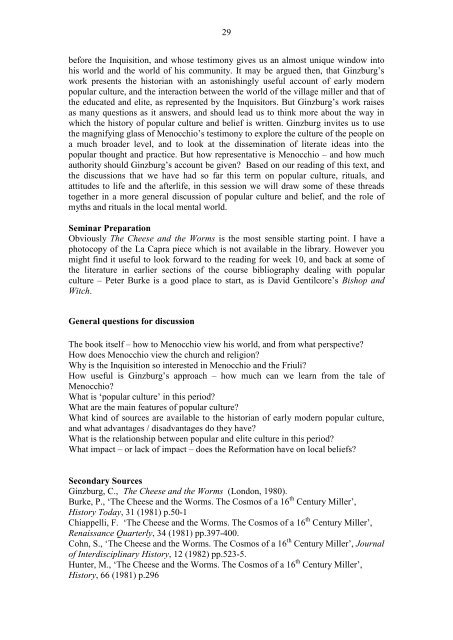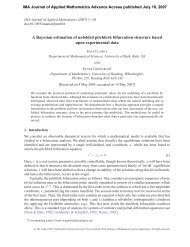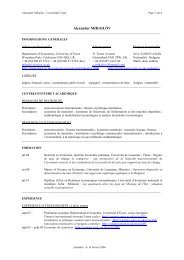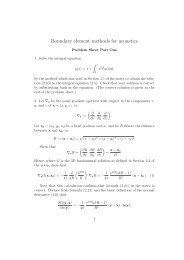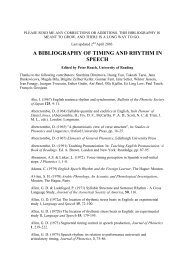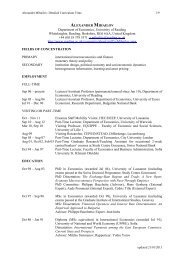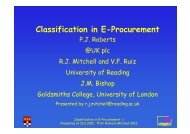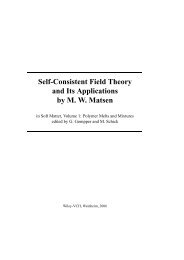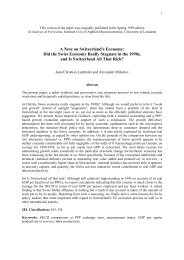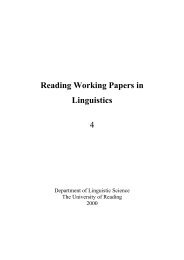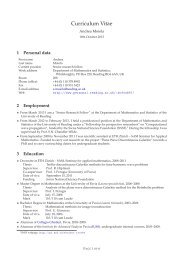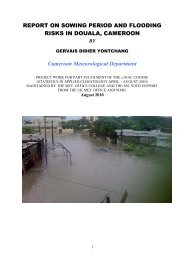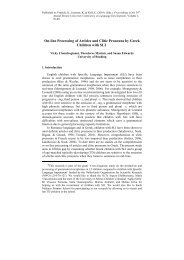Ritual, Myth and Magic in Early Modern Europe - University of Reading
Ritual, Myth and Magic in Early Modern Europe - University of Reading
Ritual, Myth and Magic in Early Modern Europe - University of Reading
You also want an ePaper? Increase the reach of your titles
YUMPU automatically turns print PDFs into web optimized ePapers that Google loves.
29<br />
before the Inquisition, <strong>and</strong> whose testimony gives us an almost unique w<strong>in</strong>dow <strong>in</strong>to<br />
his world <strong>and</strong> the world <strong>of</strong> his community. It may be argued then, that G<strong>in</strong>zburg‘s<br />
work presents the historian with an astonish<strong>in</strong>gly useful account <strong>of</strong> early modern<br />
popular culture, <strong>and</strong> the <strong>in</strong>teraction between the world <strong>of</strong> the village miller <strong>and</strong> that <strong>of</strong><br />
the educated <strong>and</strong> elite, as represented by the Inquisitors. But G<strong>in</strong>zburg‘s work raises<br />
as many questions as it answers, <strong>and</strong> should lead us to th<strong>in</strong>k more about the way <strong>in</strong><br />
which the history <strong>of</strong> popular culture <strong>and</strong> belief is written. G<strong>in</strong>zburg <strong>in</strong>vites us to use<br />
the magnify<strong>in</strong>g glass <strong>of</strong> Menocchio‘s testimony to explore the culture <strong>of</strong> the people on<br />
a much broader level, <strong>and</strong> to look at the dissem<strong>in</strong>ation <strong>of</strong> literate ideas <strong>in</strong>to the<br />
popular thought <strong>and</strong> practice. But how representative is Menocchio – <strong>and</strong> how much<br />
authority should G<strong>in</strong>zburg‘s account be given? Based on our read<strong>in</strong>g <strong>of</strong> this text, <strong>and</strong><br />
the discussions that we have had so far this term on popular culture, rituals, <strong>and</strong><br />
attitudes to life <strong>and</strong> the afterlife, <strong>in</strong> this session we will draw some <strong>of</strong> these threads<br />
together <strong>in</strong> a more general discussion <strong>of</strong> popular culture <strong>and</strong> belief, <strong>and</strong> the role <strong>of</strong><br />
myths <strong>and</strong> rituals <strong>in</strong> the local mental world.<br />
Sem<strong>in</strong>ar Preparation<br />
Obviously The Cheese <strong>and</strong> the Worms is the most sensible start<strong>in</strong>g po<strong>in</strong>t. I have a<br />
photocopy <strong>of</strong> the La Capra piece which is not available <strong>in</strong> the library. However you<br />
might f<strong>in</strong>d it useful to look forward to the read<strong>in</strong>g for week 10, <strong>and</strong> back at some <strong>of</strong><br />
the literature <strong>in</strong> earlier sections <strong>of</strong> the course bibliography deal<strong>in</strong>g with popular<br />
culture – Peter Burke is a good place to start, as is David Gentilcore‘s Bishop <strong>and</strong><br />
Witch.<br />
General questions for discussion<br />
The book itself – how to Menocchio view his world, <strong>and</strong> from what perspective?<br />
How does Menocchio view the church <strong>and</strong> religion?<br />
Why is the Inquisition so <strong>in</strong>terested <strong>in</strong> Menocchio <strong>and</strong> the Friuli?<br />
How useful is G<strong>in</strong>zburg‘s approach – how much can we learn from the tale <strong>of</strong><br />
Menocchio?<br />
What is ‗popular culture‘ <strong>in</strong> this period?<br />
What are the ma<strong>in</strong> features <strong>of</strong> popular culture?<br />
What k<strong>in</strong>d <strong>of</strong> sources are available to the historian <strong>of</strong> early modern popular culture,<br />
<strong>and</strong> what advantages / disadvantages do they have?<br />
What is the relationship between popular <strong>and</strong> elite culture <strong>in</strong> this period?<br />
What impact – or lack <strong>of</strong> impact – does the Reformation have on local beliefs?<br />
Secondary Sources<br />
G<strong>in</strong>zburg, C., The Cheese <strong>and</strong> the Worms (London, 1980).<br />
Burke, P., ‗The Cheese <strong>and</strong> the Worms. The Cosmos <strong>of</strong> a 16 th Century Miller‘,<br />
History Today, 31 (1981) p.50-1<br />
Chiappelli, F. ‗The Cheese <strong>and</strong> the Worms. The Cosmos <strong>of</strong> a 16 th Century Miller‘,<br />
Renaissance Quarterly, 34 (1981) pp.397-400.<br />
Cohn, S., ‗The Cheese <strong>and</strong> the Worms. The Cosmos <strong>of</strong> a 16 th Century Miller‘, Journal<br />
<strong>of</strong> Interdiscipl<strong>in</strong>ary History, 12 (1982) pp.523-5.<br />
Hunter, M., ‗The Cheese <strong>and</strong> the Worms. The Cosmos <strong>of</strong> a 16 th Century Miller‘,<br />
History, 66 (1981) p.296


